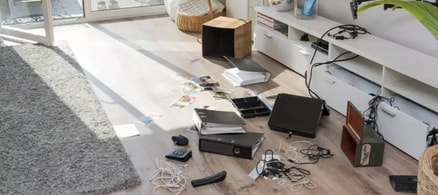Fees involved with selling a home
For homeowners, selling costs typically total 8–10% of the listing price. These costs generally include fees that fall into four categories.
1. Real estate brokerage fees (commissions)
This covers the cost of both the listing agent and buyer's agent. Most real estate brokerages charge an administration fee of $400–$500 plus a total commission of around 6%. Half of the commission goes to the brokerage representing the seller and half goes to the brokerage representing the buyer.
2. Attorney fees
Sellers pay these fees to the title company. The title company then pays the attorney and processes the transaction. Attorneys typically charge $250–$500. Other closing fees vary based on the home sale price and specific title company charges. Count on paying around $2 for every $1,000 in sales price for these other costs.
3. Ownership transfer taxes paid to the state, county and city (if applicable)
Transfer taxes are like a sales tax and vary by location. In Maryland where I live, the transfer tax totals 2% of the sale price and is generally split between the buyer and seller. The seller pays 1% (half going to the county and half going to the state government). So for a $300,000 home, the seller's portion of the transfer tax will be $3,000.
4. Court recording fee
The seller pays this fee to change the name on the title deed from their name to the buyer's name. The county recording fee is a nominal one-time fee. It varies by locality, from as low as $60 to as high as $350.
Why sellers pay most of the costs
You may not remember, but when you bought your home, you likely didn't pay any realtor fees. The seller paid the fees for both the buyer and seller agents. The thinking behind this accepted norm is that everyone is a buyer and a seller at some point. So everyone pays their share of commission fees eventually.
And buyers are typically more financially stretched than sellers as they need to come up with the down payment and lender fees. If buyers had to pay a commission on top of that, home sales would likely stagnate, and in many cases, the transaction just wouldn't be possible.
More: How to lower your closing costs when buying a home
Other possible deductions from seller net proceeds
If you have a mortgage on the home, the loan needs to be paid off when you sell.
The title company will request a payoff statement from your mortgage holder. It then diverts those funds from your seller proceeds at closing.
- Keep in mind that your mortgage payoff balance could be a little higher than the remaining balance on your mortgage because of the prorated interest and lender fees. And if applicable, you could be subject to a prepayment penalty for paying off your mortgage loan before the end of the term.
- If you have a home equity loan or line of credit, the lender requires this to be paid in full at settlement as well.
- Depending on the terms of the final purchase contract, seller closing costs could include additional negotiated fees. And costs could be added to the seller's debit side during the process from offer to closing.For example, the buyer's lender could require a termite inspection. The buyer would pay the cost of the inspection, but if the inspection shows evidence of active termites, you as the seller would pay for the pest treatment (as sellers are expected to deliver a termite-free home). In other words, you may have to cough up a buyer credit (or payment of invoices) to repair problems revealed during the home inspection process.
- Sometimes sellers provide a home warranty to the buyers. This gives buyers reassurance that they won't have to foot the bill for a major appliance repair. (I explain this below.)
And don't forget taxes
Uncle Sam wants his share. In some instances (if the home was not your primary residence, for example), you may have to pay a capital gains tax on your net proceeds when you do your taxes. And you may be subject to a state withholding tax if you are a resident of a different state from the one in which the home is located.
Preparing your home to sell
In general, the more move-in-ready your home is, the more desirable it'll be. Desirable homes sell faster and for more money. “Move-in ready” means that:
- Everything works (plumbing, appliances, electrical outlets, etc.) and you've taken care of all deferred maintenance.
- The home has been deep cleaned (baseboards, windowsills, appliances, etc.) and refreshed (new carpet if needed and wall scuff marks and blemishes have been painted).
- You've removed your personal items (photos and anything that makes a buyer think this is your home.) You want buyers to imagine themselves living there, not subconsciously thinking that they're kicking you out.
- You've decluttered and removed excess furniture.
- You've added curb appeal: mulch, flowers, pressure-washed the patio, etc. First impressions matter.
More: How to sell your rental property
To stage your home or not?
The answer depends on your personal situation and your local market. If you're selling the home you're living in, you'll likely want to remove furniture (since most of us have too much stuff) rather than add staging items. (“Staging” refers to temporarily placing furniture and other features inside and outside the house to highlight the amenities.)
But if the home is vacant, it sometimes makes sense to stage it so that buyers can better visualize how they can use the space. If you decide to stage, you don't need to go crazy filling up the space. Minimal staging of selected rooms is usually sufficient. You want to put towels in the bathrooms, a lightweight couch and end table with a lamp in the living room, and flowers and a wine setting on the kitchen counter.
Whether to stage or not also depends on local market factors. Do buyers in your locale expect to see a staged home? Are other homes on the market similar to yours being staged?
In one of the upscale neighborhoods near me, staging is a must because the homes are exceptionally large, empty-looking, and uninviting without some staging. In a few other areas, I advise clients to not waste their money on staging.
Should you hire an agent to sell your home?
“For Sale by Owner” (FSBO) homes accounted for 8% of total home sales in 2020, according to research data compiled by the National Association of Realtors (NAR). Most FSBO homeowners want to save the money that would be spent on real estate commissions.
Hiring an agent is certainly optional, but the reality is that less than 10% of FSBOs actually sell. Most FSBOs are eventually listed with an agent. This often occurs after the seller has become frustrated and lost a lot of time trying to do it themselves.
Why an agent is worth the cost
A professional realtor has the tools, expertise, and experience it takes to sell a home in the shortest amount of time for the highest amount of money. And research shows that FSBO sellers would have done much better financially if they'd listed the home with a local agent instead of trying to sell it themselves. According to NAR, the typical FSBO home sold in 2020 for $217,900 compared to $295,000 for agent-assisted home sales.
A commission of 6% seems like a huge financial outlay, but it's important to realize that there are hard costs involved. All that money isn't going into your agent's pocket, and homes don't just sell themselves.
A skilled agent will create and implement an effective marketing strategy. This includes professional photos, open houses, videos, brochures, signage, direct mail, and internet advertising. If you're selling on your own, you need to quickly become an expert negotiator, get up to speed on the local market conditions, perform a comparative market analysis to determine proper pricing and then advertise your home successfully.
Agents are able to do this cost-effectively because they've set up systems and networks. They know how the game is played. And they have an inside track to getting your home professionally marketed, negotiating a good sales price, facilitating all facets of the process, and working hard on your behalf.
But negotiate the price
Brokerage fees are negotiable. However, you shouldn't expect anyone, particularly a licensed professional with huge fiduciary responsibilities, to work for substantially less than the going market rate.
Agents are independent contractors. They pay all their own expenses. These include income tax, licensing fees, membership dues, continuing education, gas, and car maintenance, advertising, and liability insurance. Agents don't collect a salary, don't get paid vacation or sick days, and are on call for clients 24/7. And they put in the bulk of their time in the evening and on weekends.
More: How to invest in real estate with little money
Should you offer a home warranty?
It depends.
One of the concerns of first-time homebuyers is the potential cost of home maintenance. Moving from an apartment to owning a home feels overwhelming and scary. In an apartment, you call management when something breaks. With a home, you need to maintain everything yourself, including major systems like HVAC units and high-end refrigerators.
Offering a home warranty provides some incentive to would-be buyers for not a lot of money. Your real estate agent can recommend a reputable company to provide a one-year warranty policy that costs around $500. This covers repairs to all major systems and appliances. And you don't have to pay for the coverage until closing.
Also, most warranty companies cover any repair issues that come up during the listing period if you set up coverage when you initially list the home for sale.
However, in some situations, a home warranty isn't necessary. If the home has been well maintained and you can provide repair records, you probably don't need to provide one. Or if you're selling a luxury home where all the appliances are new, advertising you're including a home warranty is not likely to increase your selling price or make the home more showable.
The bottom line
Selling costs vary based on where the home is located. As a seller, expect to pay between 8% and 10% of the listing price. Selling (closing) costs typically include brokerage commissions for both the buyer and seller agents, title transfer taxes, deed recordation fees and settlement charges. You should also budget for some additional costs that may be applicable to your situation. These include hiring a professional cleaner, staging, providing a home warranty and income tax.
But you don't need to write a check for most closing costs before you actually sell. Closing costs are deducted from your proceeds of the home sale at the settlement table where you hand over the keys to the new owner. Of course, if you have very little equity in your home, you may need to bring some cash to closing to cover selling costs.







-1692125006-1695153507.jpg)
